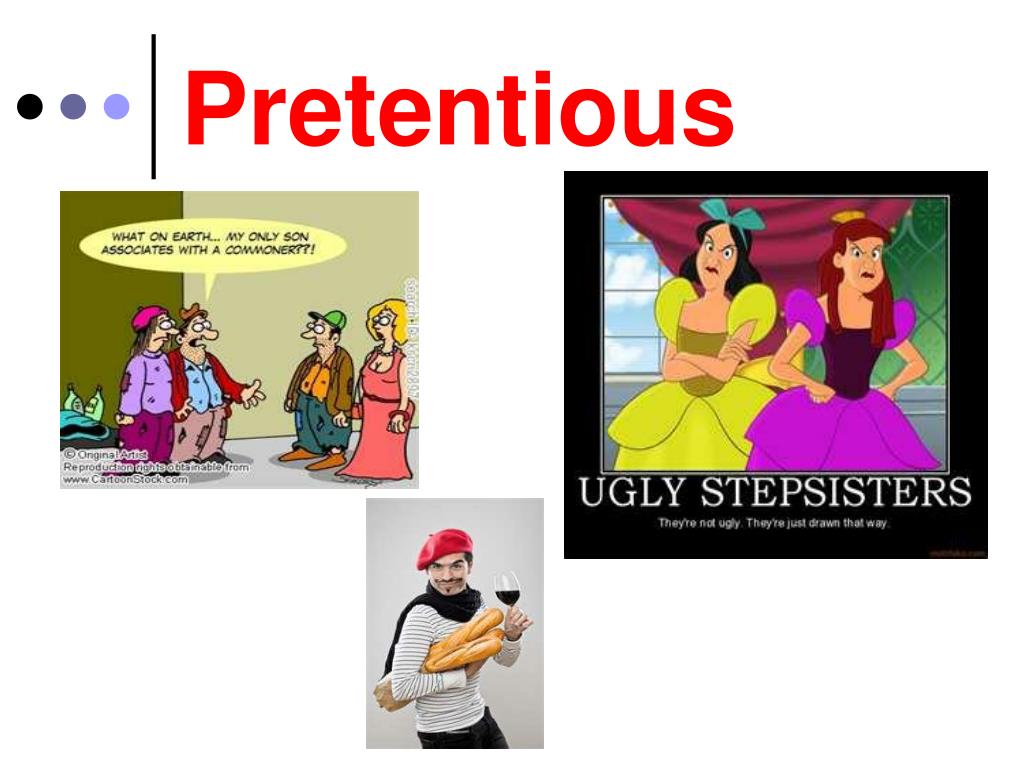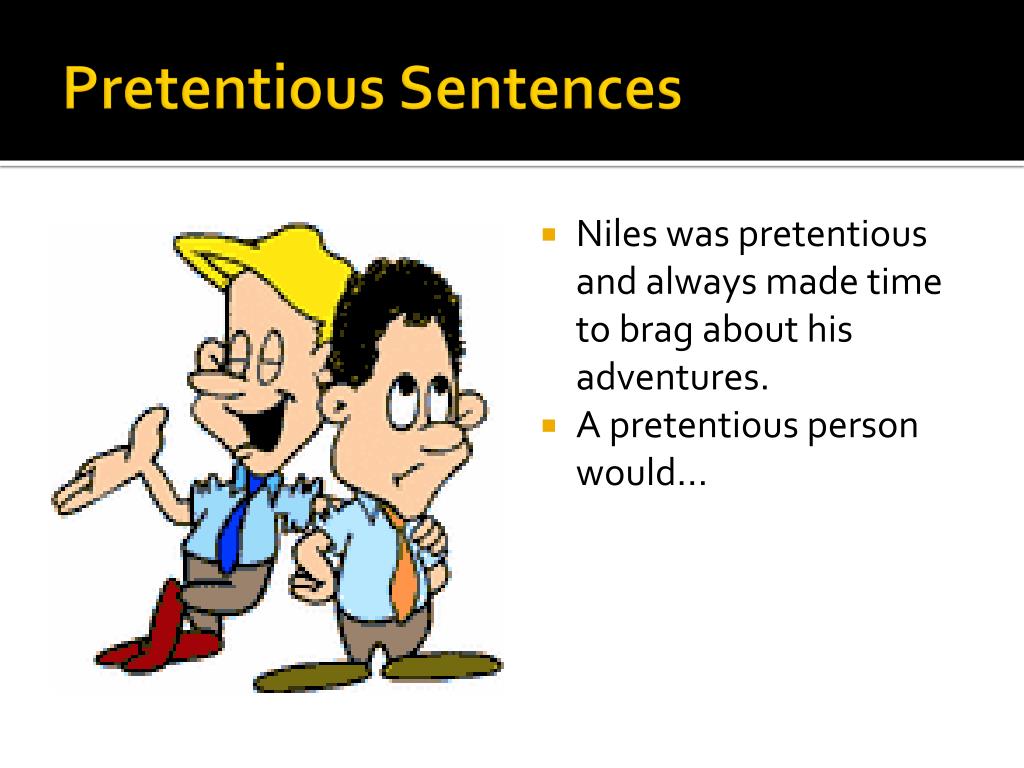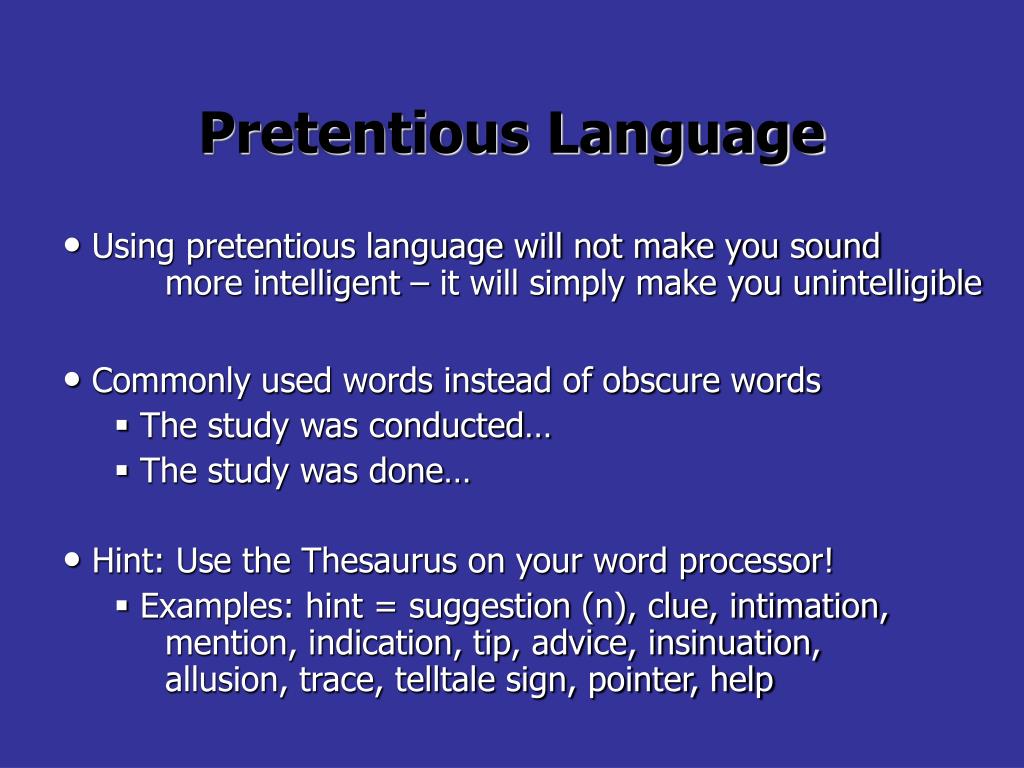Pretentious Meaning - What It Truly Means
Have you ever felt like a piece of art, a movie, or maybe even a book was just a little too much? Perhaps it seemed to be trying a bit too hard to impress, or it left you scratching your head, wondering what the big deal was. You might have even heard someone call it "pretentious," and that word, so, it gets tossed around quite a lot. It's a label that carries a certain weight, and it often sparks a lively discussion, because what one person sees as deep, another might see as simply trying to appear smarter than it is, you know?
When folks use the word "pretentious," they're often talking about something that seems to put on airs, something that acts like it's more important or clever than it actually is. It's almost like a performance where the artist, or the work itself, is trying to show off some kind of special talent or a deeper cultural insight that isn't really there. This feeling can come from anything, from a film that seems overly styled to a painting that just doesn't connect, so, it really is a broad term, isn't it?
The core idea behind something being called "pretentious" often boils down to a perception that it's trying to impress by affecting a greater sense of importance or skill than it truly holds. It’s a word that speaks to how we feel about a piece of creative work, and how we interpret its intentions. Sometimes, that feeling might stem from a disconnect between the audience and the piece, or perhaps, it’s just a way to describe something that feels a little too proud of itself, is that fair to say?
Table of Contents
- What Is the Pretentious Meaning at Its Core?
- When Does Art Get Labeled with the Pretentious Meaning?
- Is the Pretentious Meaning Just a Matter of Personal Taste?
- How Does Open Interpretation Relate to the Pretentious Meaning?
- The Look of Pretentious Meaning in Creative Work
- The Perception of Pretentious Meaning and Audience Connection
- The Idea of Pretentious Meaning and Narrative Choices
- Why Film Always Carries Some Pretentious Meaning
What Is the Pretentious Meaning at Its Core?
When we talk about the basic sense of "pretentious," it's about something that makes a show of being more significant or grand than it actually is. It’s like someone putting on an act, trying to seem smarter, more gifted, or more cultured than they really are. The dictionary, so, it backs this up, suggesting it’s about attempting to impress others by acting as if you possess qualities you don't truly have. This could be a person, a book, or even a piece of music, you know? It's about a kind of display that feels a bit fake or overdone.
Consider a situation where something feels overly styled, to the point where it seems to be showing off its own coolness or edginess. This might be a movie that uses a lot of unusual camera angles or very dark themes, not necessarily to tell the story better, but perhaps just to look cool. This kind of presentation, is that, it can sometimes feel like it's trying too hard to be seen as profound or deep, even if the actual emotional or dramatic content doesn't quite support that feeling. It's a fine line, really, between artistic choice and something that feels a bit like a performance for the sake of it.
This idea of something being "characterized by assumption of dignity or importance, especially when exaggerated or undeserved" really gets to the heart of it. It’s when something, or someone, acts as if they deserve a lot of respect or attention, but that feeling isn't earned. It’s a kind of show, a performance meant to make others think highly of it, but it doesn't quite hit the mark. So, when people say something has a "pretentious meaning," they are often pointing to this kind of exaggerated self-importance, almost like a puffed-up sense of worth.
When Does Art Get Labeled with the Pretentious Meaning?
It seems that whenever a piece of art, whether it's a movie, a story, or even a video game, isn’t particularly clear in its message or how it's presented, people tend to call it "pretentious." It's almost as if they're saying the work is full of itself because it doesn't just lay everything out for the audience. This can happen when a story leaves a lot up to the viewer to figure out, or when it uses symbols that aren't immediately obvious, you know? It's like the work expects you to do a lot of the heavy lifting to find its true worth.
Sometimes, when someone is looking at a piece of art, they might not have the right background or the way of thinking to really grasp how the art operates. When this happens, they might just label it as "pretentious" because they don't have the tools to make sense of it. It's not always the art's fault, apparently; sometimes, it's about the connection between the person observing and the creative piece. It's a common reaction, really, to call something out when it doesn't immediately make sense to you, or when it feels like it's speaking a different language.
A good way to picture this, if you want to get a sense of what "pretentious meaning" can look like in real life, is to think about a wine tasting. When things start getting a bit too much, with people talking about "notes of blackberry and a hint of old leather," you could just say, "If you hold the glass to your ear, you can hear the wind in the leaves of the vineyard." That kind of statement, it sounds deep and poetic, but it's really just a bit of a joke, showing how some things can sound important without actually saying much. It's a playful example of something trying to sound more profound than it is, more or less.
Is the Pretentious Meaning Just a Matter of Personal Taste?
The word "pretentious" is, quite frankly, a very personal word that gets used a lot. What one person finds to be a bit much, another might see as perfectly fine, or even brilliant. It's a feeling, a perception, that comes from the person who is experiencing the art or media. So, when a work seems to carry a "pretentious meaning," it’s really a personal way of seeing things, a subjective take by the person watching or listening. This is, you know, what makes discussing art so interesting, because everyone brings their own thoughts to the table.
This idea that "pretentious is a perception of a viewer" is a big one. It means that the work itself isn't inherently pretentious; it's how someone views it that gives it that label. A film might try to take on a very big idea, for example, but whether it succeeds or comes across as putting on airs, that depends on the person watching it. This is, in a way, what criticism is all about. It's about expressing how a piece of work makes you feel and what you think its intentions are, even if others disagree. It's never a simple yes or no answer, is that right?
You might even say that a film, or any piece of art, tried to take on more than it could handle, or "tried to bite off" more than it could chew. This doesn't automatically make it pretentious, though. It just means it aimed high and perhaps didn't quite reach its goal. The perception of "pretentious meaning" really comes from that feeling that the ambition isn't matched by the actual quality or genuine depth. It's a judgment, basically, on whether the effort to impress feels honest or just for show, and that judgment is always going to be personal, very personal.
How Does Open Interpretation Relate to the Pretentious Meaning?
Some people feel that leaving a story open to interpretation, where the audience has to actively try to figure out what it means, is a storytelling approach that's a bit out of date. They might see it as forcing the audience to do too much work, rather than just enjoying the narrative. This approach, where the story doesn't spell everything out, can sometimes be seen as a sign of "pretentious meaning" because it implies the work is too clever for its own good, or that it's hiding its true message behind a veil of ambiguity. It's like the story is saying, "Figure me out if you can," which some find annoying, you know?
When a narrative is not particularly straightforward in its message or how it's presented, it can often be called "pretentious." It's as if the audience feels the work is filled with a sense of self-importance, just because it doesn't give them all the answers. This isn't always fair, of course, because many great works of art encourage thought and discussion by not being completely clear. But for some, the lack of a clear, direct message is taken as a sign that the creator is just trying to be difficult or show off their intellectual prowess, basically.
The idea that an open ending or a story that requires a lot of audience participation is "obsolete" suggests a preference for more traditional, clear-cut narratives. If a story doesn't have a clear beginning, middle, and end, or if its meaning isn't immediately obvious, some might classify it as having a "pretentious meaning" because it deviates from what they expect. It’s a critique of a particular storytelling choice, really, where the viewer is expected to piece things together rather than just passively receive the information. It’s a point of view, naturally, that highlights a desire for directness in creative works.
The Look of Pretentious Meaning in Creative Work
When something is called "pretentious," it often comes down to how it looks or feels. A film, for instance, might be seen as having a "pretentious meaning" if it's overly styled. This means it uses a lot of visual tricks, like very dark lighting, unusual camera angles, or a certain kind of gritty feel, not because it serves the story directly, but almost as if to make itself seem cool or edgy. It's about the appearance, really, more than the substance, and that's where the feeling of something being a bit too much can come from, is that the case?
Consider the film "Se7en," for example. Some people might classify it as having a "pretentious meaning" because of its very distinct visual style and its dark, philosophical themes. The way it looks, the way it presents its ideas, might strike some viewers as trying too hard to be profound or shocking. It’s a powerful film, certainly, but its intense atmosphere and grim outlook could, for some, cross the line into seeming a bit self-important. It’s about how the aesthetic choices are perceived, more than anything else, you know?
This feeling of something being "overly stylized" is a key part of what gives some works a "pretentious meaning" in the eyes of an audience. It's when the form seems to overshadow the content, when the way something is presented seems to be more important than what it's actually trying to say. It's a visual or auditory performance that aims to impress, but perhaps misses the mark for some, leading them to feel it's just putting on airs. It’s a very common observation, actually, when discussing films that lean heavily on a particular visual identity.
The Perception of Pretentious Meaning and Audience Connection
The idea that "pretentious is a perception of a viewer" really highlights how much the audience plays a part in defining whether something has a "pretentious meaning." A work doesn't just exist in a vacuum; its meaning, and how it's received, is shaped by the person experiencing it. If someone lacks the right way of looking at things, or the proper background to connect with a piece of art, they might just label it as pretentious. It's not necessarily a flaw in the art, but rather a gap in how it's being received, you know?
When someone says that a piece of art "lacks the framework to understand how the art works," it points to this disconnect. It's like trying to read a book in a language you don't speak; it's not the book's fault you can't understand it, but you might still feel frustrated by it. This frustration, or this feeling of being left out, can sometimes lead to the label of "pretentious meaning." It's a way of saying, "This isn't for me, and it feels like it's trying to be smarter than it needs to be," which is a very human reaction, apparently.
The subjective nature of this word means that what feels like a genuine, deep expression to one person might feel like a performance to another. It’s about how the work lands with an individual. You might see a film and think it's trying to take on too much, or "tried to bite off" more than it could handle, and that feeling contributes to your personal sense of its "pretentious meaning." It’s a personal interpretation, basically, and that’s what makes discussions about art so lively and varied, because everyone has their own lens, very truly.
The Idea of Pretentious Meaning and Narrative Choices
When a story chooses to leave things open, allowing the audience to figure out the deeper layers, some people might see this as a sign of "pretentious meaning." They might argue that this kind of open-ended storytelling is an older way of doing things, and that it puts too much pressure on the audience to actively uncover the message. It's like the story isn't confident enough to just tell you what it means, so it makes you do the work instead. This perspective suggests a preference for narratives that are more direct and less reliant on the viewer's interpretation, you know?
This feeling that a story is "filled" with something unnecessary, or that it's trying too hard to be clever by being vague, is often at the root of the "pretentious meaning" label. It's when a piece of media isn't straightforward in its message or how it's presented. For some, this lack of clarity isn't a sign of artistic depth, but rather a sign of the work trying to appear more significant than it is. It's a critique of narrative choices that prioritize ambiguity over clear communication, which is a fair point for some viewers, basically.
To clarify, when we talk about a narrative that forces the audience to "actively try to uncover the meaning," it's about stories that don't hand you all the answers. This can be a powerful storytelling tool, but for those who prefer a more direct experience, it can feel like the work is being deliberately obscure. This choice, while artistic for some, can contribute to the perception of "pretentious meaning" if it feels like the ambiguity is there just for the sake of it, rather than serving a genuine artistic purpose. It's a balance, really, between inviting thought and simply being unclear, isn't it?
Why Film Always Carries Some Pretentious Meaning
It's worth considering that film, in a way, always has some kind of meaning, even if that meaning is just about not having a deeper meaning at all. Even a movie that aims to be purely entertaining, without any grand message, is still communicating something. This idea, that a film always carries meaning, can sometimes be poorly done. A movie might try to say something, but fail to do so effectively, or it might accidentally convey something it didn't intend. But this doesn't, by itself, make the film "pretentious," you know?
The mere fact that a film's meaning might be poorly executed doesn't automatically give it a "pretentious meaning." A film can try to be deep or thought-provoking and just not succeed, without necessarily putting on airs. The label of "pretentious" usually comes when the attempt to be profound feels disingenuous, or when the style seems to be there just to impress, rather than to serve the story or its ideas. It's a distinction, basically, between a noble failure and a showy attempt, is that clear?
You might also say that a film "tried to bite off" more than it could handle, meaning it aimed for something grand but didn't quite pull it off. This is a common criticism, and it's a valid one. For instance, some people might classify "Se7en" as having a "pretentious meaning" because of its heavy themes and stylized approach, feeling that it tried to be more profound than it actually was. However, that's a personal take, and it doesn't mean the film is inherently pretentious. It just means that its ambition, for some, didn't quite land in a way that felt authentic, very truly.

PPT - Vocabulary Words American Literature PowerPoint Presentation

PPT - Pride & Prejudice Vocab PowerPoint Presentation, free download

PPT - Do’s and Don’ts of Scientific Writing PowerPoint Presentation